Marchés
Lors de la conception d’une intervention humanitaire et de la prise de décisions quant à l’utilisation des transferts monétaires, l’analyse générale des options de réponse doit inclure une analyse de marché. Il est prouvé qu’offrir un soutien ciblant le fonctionnement des marchés accélère la reprise et accroît la résilience dans les zones affectées par une catastrophe.
De nombreuses organisations ont investi dans la mise au point d’outils visant à faciliter l’analyse de marché et réfléchissent à la mise en place de programmes basés sur les marchés plus holistiques. Elles envisagent des interventions tirant profit du marché (basées notamment sur des transferts monétaires aux populations affectées), ainsi que des interventions soutenant directement les marchés (comme l’octroi de subventions conditionnelles aux vendeurs/euses pour la remise en condition du marché).
Initiatives associées
Contenu associé

1.2 Introduction à l’analyse de marché
Cours
Ce cours de 30 minutes offre une introduction à l’analyse de marché pour les contextes d’urgence. Il contient des contributions d'experts dans ce domaine. Ce cours a été développé en collaboration avec l'International Rescue Committee et le CALP Network et grâce au financement d’USAID/OFDA et de l’Agence Suisse pour le Développement et la Coopération. Il est destiné aux...

2.4 Un guide pratique pour l’analyse de marché
Cours
Ce cours en ligne de 3.5 heures vise à fournir aux équipes qui conduiront des analyses de marchés en contextes humanitaires une compréhension approfondie de la théorie et des étapes à suivre afin de leur permettre de comprendre le pourquoi et le comment du processus à suivre. Les participants seront guides à travers un scenario d'analyse de marchés d'urgence. Ce cours s'appuie sur...
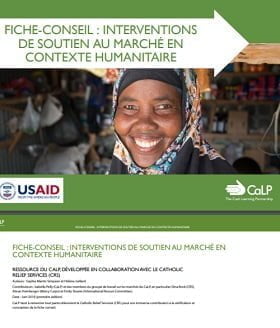
Fiche-Conseil : Interventions de soutien au marché en contexte humanitaire
Guides et outils
La fiche conseil définit le programme de soutien au marché en contexte humanitaire et le décrit dans la pratique. Elle permet aux praticiens humanitaires d’envisager systématiquement des interventions de soutien au marché, parallèlement à d’autres activités du programme. Le champ d’application comprend des interventions de soutien au marché axées sur l’offre/la disponibilité...
Thematic lead
Latest

Case Study: Indonesia – Sumatra 2009
Report
On 30th September 2009 a series of earthquakes struck West Sumatra, not far from the provincial capital of Padang. 13 out of the 19 districts in West Sumatra province were affected. Between earthquakes and landslides nearly 250,000 houses were destroyed or heavily damaged. This case study examines the...

Strategies for Development in Conflict Affected Countries in the ESCWA Region: The role of the state and private sector
Report
This study on private sector resilience in conflict-affected countries in the ESCWA region is part of a series of publications, which examines mechanisms and policies for development in spite of conflict. The studies include policy recommendations that are aimed at enhancing the capacity of policymakers...
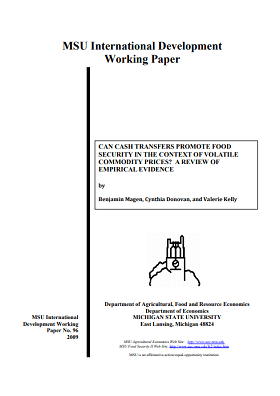
Can Cash Transfers Promote Food Security in the Context of Volatile Commodity Prices? A Review of Empirical Evidence
Report
This working paper synthesizes the theoretical and empirical literature on the use of cash transfers in response to food crisis situations, with particular attention to their use in situations that are exacerbated by volatile, often inflationary, commodity prices. The paper is designed for policymakers...

Cash transfers in emergencies: A synthesis of World Vision’s experience and learning
Report
This HPG study report, commissioned by World Vision, looks at the shifting view towards cash programming by the humanitarian community, and focuses on the specific challenges and needs which World Vision would have to address when considering the use of cash in emergencies. A general background of cash...

Beneficiary perceptions of corruption in humanitarian assistance: A Sri Lanka case study
Case Study
This case study, based on a number of chosen villages in Sri Lanka, examines the views of beneficiaries on corruption in the delivery of humanitarian assistance. It begins by outlining some of the corruption risks that agencies may face during emergency responses, particularly in conflict-affected...
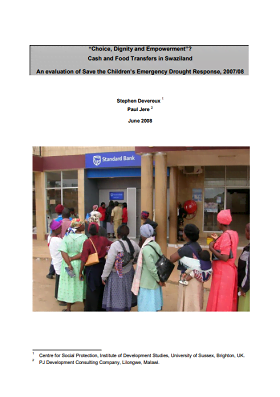
Choice, dignity and empowerment? Cash and food transfers in Swaziland: An evaluation of Save the Children’s emergency drought response
Case Study
This evaluation report looks at the Save the Children’s cash transfer project, which was a response to the 2007/8 food crisis in Swaziland, with the aim of not only providing humanitarian assistance but also as a way to break the dependency of rural families on food aid. Selected beneficiaries were...

Practitioners’ Guide to the Household Economy Approach
Guidelines and Tools
This guide is aimed at those carrying out household economy approach (HEA) assessments, and is intended to serve as both a refresher guide for experienced practitioners and a set of reference reading materials to accompany formal trainings for new practitioners. The Practitioners’ Guide is presented as...

Lignes directrices sur les programmes de transferts monétaires
Guides et outils
Un guide pratique, qui comprend aussi les fiches d’orientation et une section sur les outils pratiques. S’appuyant sur le large éventail d’expériences en transferts monétaires au sein du Mouvement de la Croix Rouge et du Croissant Rouge, et dans le secteur humanitaire en général, ces directives...

A Synthesis of Practical Lessons from Value Chain Projects in Conflict Affected Environments
Report
Over the last year, at the behest of USAID, 10 organizations captured results and lessons learned from projects that used value chain programming in conflict-affected environments. The goal of this paper is to extract larger lessons that emerge from these implementing organizations and the programs they...

The Use of Cash Grants in UNHCR Voluntary Repatriation Operations: Report of a lessons learned workshop
Report
On 4 April 2008, UNHCR’s Division of Operational Services and the Policy Development and Evaluation Service (PDES) co-sponsored a workshop on the use of cash grants in UNHCR repatriation operations. A total of 25 UNHCR staff members participated, together with six experts and researchers from Oxfam GB,...
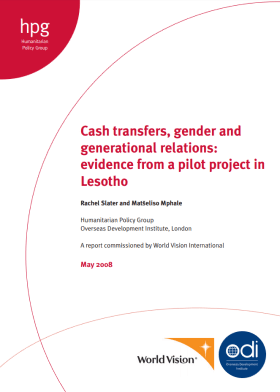
Cash Transfers, Gender and Generational Relations: Evidence from a Pilot Project in Lesotho
Report
Food aid has been the main response to repeated and protracted humanitarian crises in Lesotho since 2002, and during that time it has also been the major part of World Vision’s emergency responses. Along with the government, donors and NGOs, World Vision is increasingly interested in the role that cash...

A summary of the British Red Cross cash grants for livelihood recovery in Aceh, Indonesia
Case Study
From April 2005 to June 2008, the British Red Cross Society (BRCS) disbursed more than USD 10 million in cash grants directly to over 10,000 tsunami-affected people in Aceh to support the recovery of their predominantly agriculture and fisheries-based livelihoods. This study draws lessons from the rich...

Value Chain Tools for Market Integrated Relief Haiti’s Construction Sector
Report
This case study seeks to apply and document the use of the value chain approach to channel infrastructure program design from direct implementation to a market-integrated relief model. The market-integrated relief approach addresses the needs of crisis-affected populations by working through local...
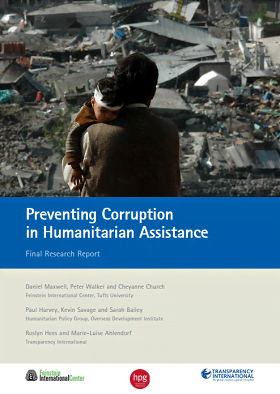
Preventing Corruption in Humanitarian Assistance
Report
This report by Transparency International describes the research on the problem of corruption in humanitarian assistance, based on evidence from seven major international NGOs. It does not try to assess the degree of corruption in any one agency, or country, rather it seeks to document perceptions of...
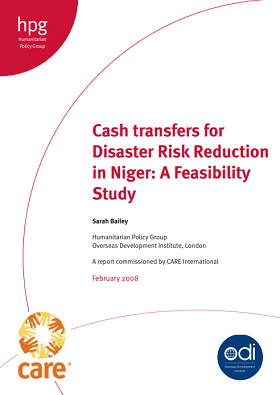
Cash Transfers for Disaster Risk Reduction in Niger: A Feasibility Study
Case Study
This HPG study report, commissioned by CARE, examines the appropriateness, cost-effectiveness and feasibility of cash transfer programming as part of a disaster risk reduction (DRR) strategy in Niger. It gives a general livelihood context of Niger and then looks at the feasibility and appropriateness,...

Cash Transfers in Lesotho: An evaluation of World Vision’s Cash and Food Transfers Pilot Project
Report
The Cash and Food Transfers Pilot Project (CFTPP) was designed and implemented as World Vision‟s contribution to the humanitarian response to the 2007/08 food crisis in Lesotho. This crisis was triggered by Lesotho‟s worst drought in 30 years, which reduced maize yields by 42% and left an estimated...
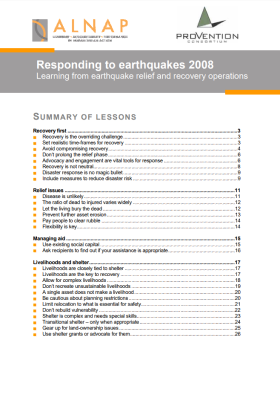
Responding to Earthquakes: Learning from earthquake relief and recovery operations
Policy paper
This paper aims to provide a distillation of the learning from thirty years of humanitarian response to earthquakes. It concentrates on issues of particular relevance in earthquakes. The paper assumes that readers are already familiar with the more general lessons in the aid sector such as the key...

Case Study of the Poultry and Grape/Raisin subsectors in Afghanistan: Guided case study in value chain development for conflict-affected environments
Report
Is the value chain approach effective for restoring market-based economic activity in a severely affected post-conflict environment?. The goal of this study is to gather empirical evidence to answer this question, looking at the role of the value chain approach in the work of USAID’s Rebuilding...

Evaluation of Concern Kenya’s Kerio Valley Cash Transfer Pilot (KVCTP)
Report
The Kerio Valley Cash Transfer Pilot (KVCTP) was Concern and its local partner the Catholic Diocese of Eldoret’s short-term and targeted response to the food security problems that affected communities in four Sub-locations in Baringo North and Pokot East Districts as a result of the post election...

Cash grants aid recovery in the Bahamas after Tropical Storm Noel
Case Study
This case study of the first ever Bahamas Red Cross unconditional cash grant programme looks at the decision-making process behind the programme, and planning and implementation stages. Support from the American Red Cross is highlighted, lessons learnt are identified and a personal story is provided.
